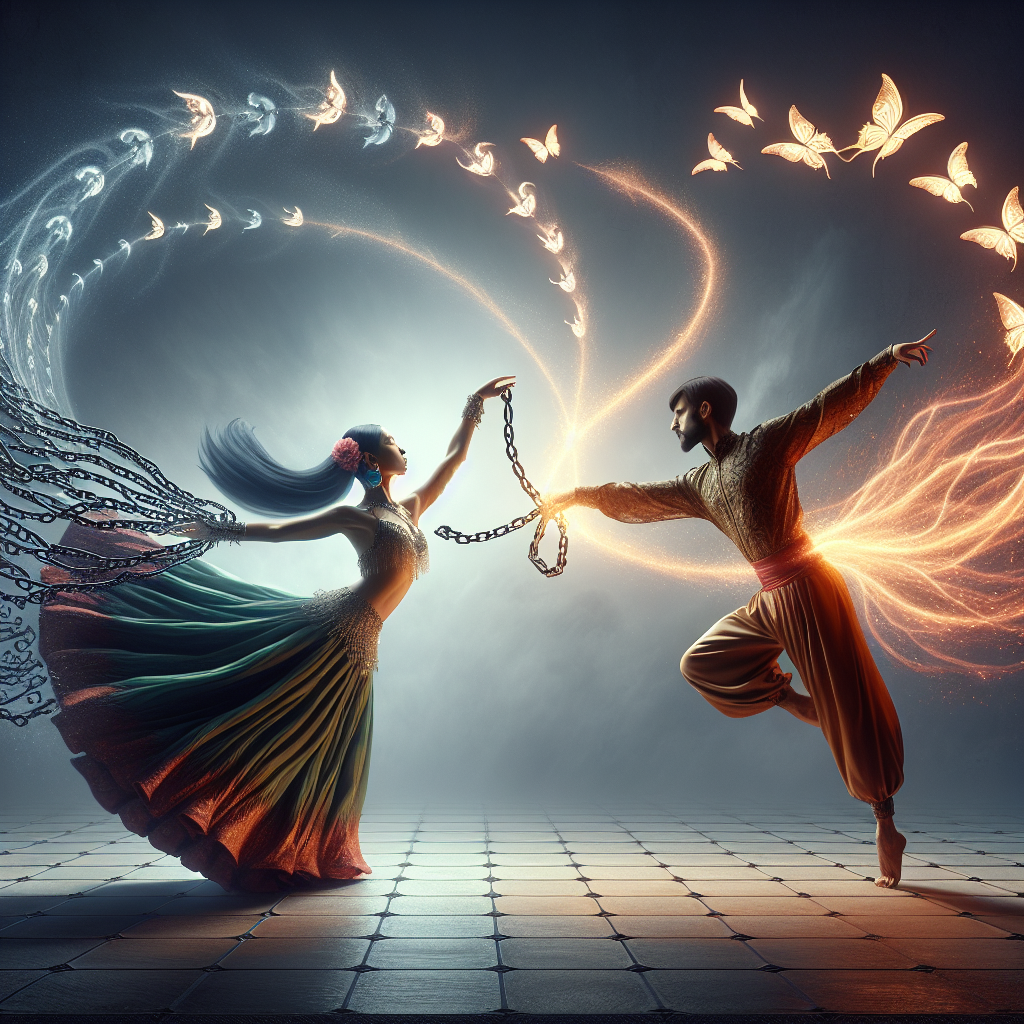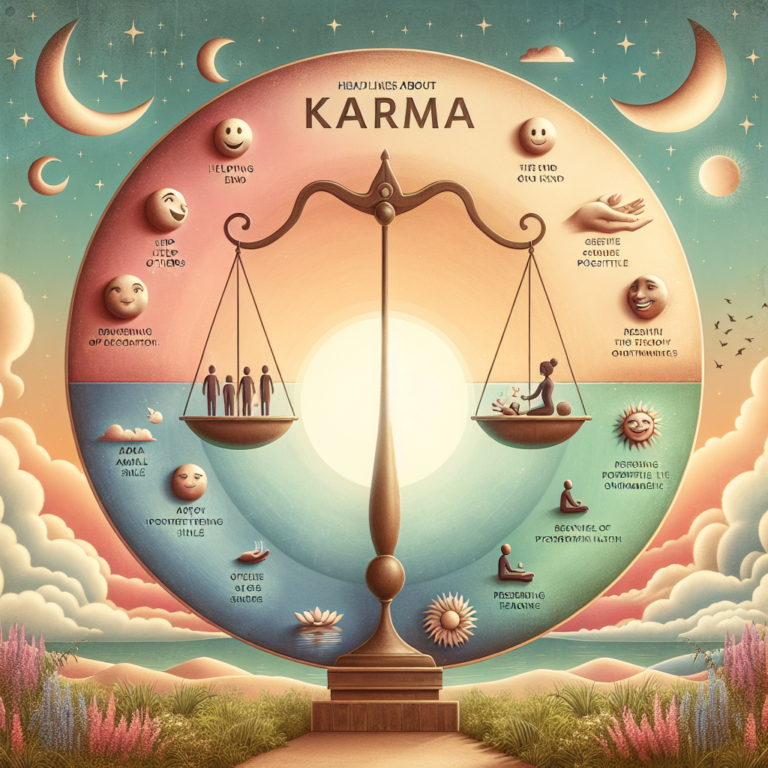In the intricate tapestry of human experience, the intertwining threads of actions, consequences, and interpersonal relationships create a complex pattern we often refer to as karma. But what does karma mean for us, and how does it influence our emotional and spiritual well-being? Central to this exploration is the concept of forgiveness—a powerful tool that can liberate us from the burdens of our past. This article delves into the dance of karma, illustrating how forgiveness not only aids in healing personal wounds but also facilitates a more profound connection with ourselves and others.
Understanding Karma
Karma is a term derived from Sanskrit, meaning "action" or "deed." It encompasses the principle that every action has consequences, not just in this life but also in the cycles of birth and rebirth. While karma is often viewed through a spiritual lens, it can also be understood in a psychological context: our actions elicit emotional responses, shaping the quality of our relationships and mental health.
When we act with positivity, compassion, and understanding, we can create a ripple effect of goodwill. In contrast, negative actions can lead to feelings of resentment, anger, and guilt—emotions that often become heavy burdens that we carry through our life’s journey.
The Burden of Unforgiveness
Unforgiveness acts like a poison that seeps into our emotional and physical state, affecting our overall well-being. Holding onto grudges or failures can lead to cyclical thoughts that perpetuate negative feelings, ultimately leading to stress and anxiety. This emotional congestion can also manifest physically, as unprocessed negative emotions may result in ailments ranging from headaches to heart disease.
Many individuals struggle with the dichotomy of wanting to forgive yet feeling justified in their anger or hurt. This internal battle creates a discord that complicates the already intricate dance of karma in our lives. The truth is, when we choose to withhold forgiveness, we not only imprison those who have wronged us but also ourselves, rendering us prisoners of our past experiences.
The Power of Forgiveness
Forgiveness is a conscious, deliberate decision to release the grip of anger, resentment, or blame that we hold toward someone who has caused us pain. It is crucial to understand that forgiveness is not about condoning a wrongdoing; rather, it is a means of liberating ourselves from the shackles of past grievances.
Releasing the Past: Embracing forgiveness allows us to acknowledge the pain we’ve experienced while relinquishing our attachment to it. By forgiving, we stop allowing past actions to dictate our present happiness.
Healing Emotional Wounds: Studies have shown that practicing forgiveness can lead to improved mental health outcomes. It reduces symptoms of depression and anxiety, fostering emotional resilience.
Creating Peace: When we forgive others, we foster a sense of peace within ourselves. This peace extends outward, positively influencing our interactions with others and enhancing our relationships.
Cultivating Compassion: Forgiveness is intrinsically linked to compassion. By understanding that all people are flawed and capable of mistakes, we nurture empathy and loving-kindness—not only for others, but for ourselves as well.
- Empowering Change: Forgiveness empowers us to break free from the cycles of negativity that detract from our growth. It offers room for renewal, pushing us towards personal development and the acquisition of wisdom derived from our experiences.
The Cycle of Forgiveness and Karma
The dance of karma and forgiveness can be viewed as a cyclical process. When we forgive, we disarm the energy of past actions, thereby transforming the negative karmic imprints into opportunities for growth. Here’s how this cycle unfolds:
Recognition: Understanding the impact of past actions lays the groundwork for forgiveness. Acknowledging pain is the first step toward emotional release.
Decision to Forgive: This stage involves the choice to let go. It can be a difficult decision, especially when feelings of hurt and anger linger. However, it is critical for establishing a new foundation.
Letting Go: Engaging in activities or practices that facilitate emotional release—such as journaling, meditation, or therapy—can aid in fully letting go. This process encourages a shift in energy away from resentment.
Renewed Perspective: Upon achieving forgiveness, individuals often experience a radical change in perspective, viewing the actions of others through a more compassionate lens.
- Positive Karmic Energy: The cycle culminates in creating space for new, positive karmic imprints. Forgiveness leads to actions rooted in love and kindness, generating goodwill that reverberates throughout our lives and relationships.
Conclusion
The dance of karma and forgiveness is a transformative journey that us offers deep healing and liberation. By embracing forgiveness, we free ourselves from the shackles of our past and create fertile ground for new beginnings. It is an act of immense courage—an acknowledgment that, while we may have been wronged, we have the power to shape our future. Breaking the cycle of negativity enhances our emotional well-being and fosters a more compassionate, loving world.
Forgiveness asks us to navigate our life’s complexities with grace, understanding, and an open heart. By learning to forgive ourselves and others, we step into a new rhythm that celebrates healing, growth, and connection—ultimately nurturing the profound dance of life itself.
FAQs
1. What is the significance of karma?
Karma highlights the consequences of our actions and emphasizes the interconnectedness of life, suggesting that both positive and negative actions can influence our experiences and relationships.
2. How can I practice forgiveness?
You can start by reflecting on your feelings, understanding the pain caused, and consciously choosing to let go of resentment. Activities like journaling, talking to someone you trust, or seeking therapy can help facilitate this journey.
3. Does forgiveness mean I have to forget the wrongdoing?
No, forgiveness does not require forgetting. It means acknowledging the pain while choosing to release its emotional hold on you for your own well-being.
4. Can forgiveness improve my mental health?
Yes! Research indicates that practicing forgiveness can lead to lower levels of depression and anxiety, fostering emotional stability and resilience.
5. Is it necessary to forgive everyone?
Forgiveness is a personal journey. It may not always be possible or necessary to forgive everyone, but striving towards forgiveness can generally enhance your emotional well-being.
6. How long does it take to forgive?
The timeline for forgiveness varies greatly among individuals and situations. It is important to be patient with yourself and recognize that forgiveness is a personal process that unfolds in its own time.
It seems like you might be looking for a prompt! Here are a few different types you might consider:
### Creative Writing Prompt:
“While exploring an old library, you stumble upon a dusty book that is not supposed to exist. When you open it, the words begin to glow, and you are transported into the story. Describe the world you enter and the adventure that awaits you.”
### Journal Prompt:
“Reflect on a time when you faced a significant challenge. What did you learn about yourself through that experience, and how has it shaped who you are today?”
### Art Prompt:
“Create a piece of artwork inspired by a dream you had. Focus on the colors, emotions, and imagery that were most vivid in your mind.”
### Discussion Prompt:
“What role do you believe technology plays in shaping human relationships? Consider both the positive and negative impacts it has had on communication.”
If you’re looking for something specific, please let me know!, #Dance #Karma #Forgiveness #Frees, #Dance #Karma #Forgiveness #Frees, 1735517597, the-dance-of-karma-how-forgiveness-frees-us-from-our-past




